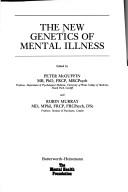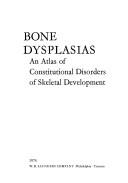| Listing 1 - 10 of 1758 | << page >> |
Sort by
|
Book
ISBN: 128385404X 0123859018 012385900X 9780123859013 9780123859006 Year: 2013 Publisher: London : Academic Press,
Abstract | Keywords | Export | Availability | Bookmark
 Loading...
Loading...Choose an application
- Reference Manager
- EndNote
- RefWorks (Direct export to RefWorks)
Nutrigenetics: Applying the Science of Personal Nutrition provides a fully referenced, readable guide to understanding the rationale and importance of nutrigenetic applications and explains why single nutrition recommendations will not fit everybody or even a majority of modern humans. This books explains how genetic variation shapes individual nutrition requirements and sensitivities, presents questions to ask about reported gene-nutrient interactions, and what needs to be done before putting nutrigenetic tests to practical use. This book blends key concepts from the fields o
Nutrition --- Genetic aspects. --- Genetics
Book
ISBN: 1412367948 Year: 2009 Publisher: Chicoutimi : J.-M. Tremblay,
Abstract | Keywords | Export | Availability | Bookmark
 Loading...
Loading...Choose an application
- Reference Manager
- EndNote
- RefWorks (Direct export to RefWorks)
Book
ISBN: 9086866727 908686094X Year: 2009 Publisher: Wageningen, The Netherlands : Wageningen Academic Publishers,
Abstract | Keywords | Export | Availability | Bookmark
 Loading...
Loading...Choose an application
- Reference Manager
- EndNote
- RefWorks (Direct export to RefWorks)
Book
ISBN: 0128041986 012804182X 9780128041987 9780128041826 Year: 2018 Publisher: London Waltham, MA
Abstract | Keywords | Export | Availability | Bookmark
 Loading...
Loading...Choose an application
- Reference Manager
- EndNote
- RefWorks (Direct export to RefWorks)
Bones --- Diseases --- Genetic aspects.

ISBN: 0750600292 1322300933 1483164276 Year: 1991 Publisher: Oxford : Butterworth-Heinemann,
Abstract | Keywords | Export | Availability | Bookmark
 Loading...
Loading...Choose an application
- Reference Manager
- EndNote
- RefWorks (Direct export to RefWorks)
Book
ISBN: 1617051780 9781617051784 9781620700143 162070014X Year: 2015 Publisher: New York : demosMEDICAL,
Abstract | Keywords | Export | Availability | Bookmark
 Loading...
Loading...Choose an application
- Reference Manager
- EndNote
- RefWorks (Direct export to RefWorks)
Cardiovascular Genetics and Genomics in Clinical Practice presents clinical cases to illuminate basic concepts of cardiovascular genetics and genomics as practitioners encounter them in day-to-day practice. The unique use of real-world case discussions facilitates the memorization and understanding of basic principles, which can be more readily applied to actual cases. Cardiovascular Genetics and Genomics in Clinical Practice features a step-by-step learning process that begins with an easy-to-understand ""primer"" of basic scientific concepts regarding cardiovascular genetics and genomics fol
Heart --- Diseases --- Genetic aspects.
Book
ISBN: 1910797669 1910797642 Year: 2018 Publisher: [Place of publication not identified] : Health Press,
Abstract | Keywords | Export | Availability | Bookmark
 Loading...
Loading...Choose an application
- Reference Manager
- EndNote
- RefWorks (Direct export to RefWorks)
Bladder --- Cancer --- Genetic aspects.
Book
ISBN: 1400890500 Year: 2018 Publisher: Princeton, NJ : Princeton University Press,
Abstract | Keywords | Export | Availability | Bookmark
 Loading...
Loading...Choose an application
- Reference Manager
- EndNote
- RefWorks (Direct export to RefWorks)
The untold story of how hereditary data in mental hospitals gave rise to the science of human heredityIn the early 1800s, a century before there was any concept of the gene, physicians in insane asylums began to record causes of madness in their admission books. Almost from the beginning, they pointed to heredity as the most important of these causes. As doctors and state officials steadily lost faith in the capacity of asylum care to stem the terrible increase of insanity, they began emphasizing the need to curb the reproduction of the insane. They became obsessed with identifying weak or tainted families and anticipating the outcomes of their marriages. Genetics in the Madhouse is the untold story of how the collection and sorting of hereditary data in mental hospitals, schools for "feebleminded" children, and prisons gave rise to a new science of human heredity.In this compelling book, Theodore Porter draws on untapped archival evidence from across Europe and North America to bring to light the hidden history behind modern genetics. He looks at the institutional use of pedigree charts, censuses of mental illness, medical-social surveys, and other data techniques--innovative quantitative practices that were worked out in the madhouse long before the manipulation of DNA became possible in the lab. Porter argues that asylum doctors developed many of the ideologies and methods of what would come to be known as eugenics, and deepens our appreciation of the moral issues at stake in data work conducted on the border of subjectivity and science.A bold rethinking of asylum work, Genetics in the Madhouse shows how heredity was a human science as well as a medical and biological one.

ISBN: 0792309634 Year: 1990 Publisher: Dordrecht : Kluwer,
Abstract | Keywords | Export | Availability | Bookmark
 Loading...
Loading...Choose an application
- Reference Manager
- EndNote
- RefWorks (Direct export to RefWorks)

ISBN: 0721685226 Year: 1974 Publisher: Philadelphia (Pa.) : Saunders,
Abstract | Keywords | Export | Availability | Bookmark
 Loading...
Loading...Choose an application
- Reference Manager
- EndNote
- RefWorks (Direct export to RefWorks)
Bones --- Diseases --- Genetic aspects.
| Listing 1 - 10 of 1758 | << page >> |
Sort by
|

 Search
Search Feedback
Feedback About UniCat
About UniCat  Help
Help News
News